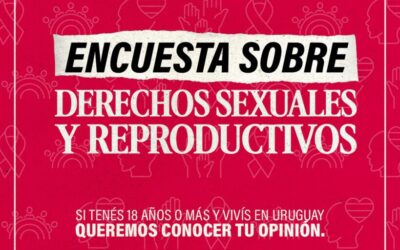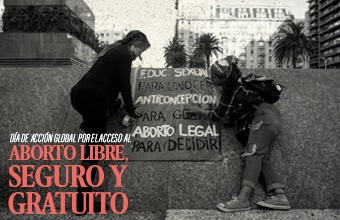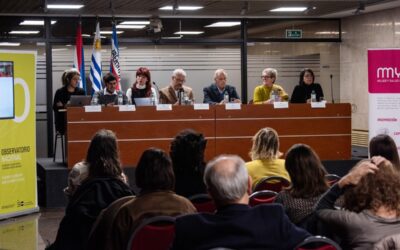In the framework of the citizen platform of the civil society organizations that participate in the National Days on Health and Sexual and Reproductive Rights, MYSU, together with the Secretary of Gender, Equality and Diversity of the PIT- CNT (National Trade Union Centre), issues the following statement:
MUJER Y SALUD EN URUGUAY (WOMEN AND HEALTH IN URUGUAY)
PUBLIC STATEMENT 28th of September: International Day for the Decriminalization of Abortion.
It was in 1990, during the Fifth Latin American and Caribbean Feminist Meeting in San Bernardo, Argentina, that it was agreed that the 28th of September would be designated as the Day for the decriminalization of abortion in the region. The demand came from feminist organizations before the unjust situation of the illegal or clandestine practice of abortion, which is responsible for a high level of mortality amongst women.
However, even today, according to estimates of the World Health Organization, 22 million unsafe abortions take place in the world each year: 47 thousand pregnant women die due to complications which arise from unsafe abortions and 40% of women of reproductive age live in countries where abortion is forbidden or restricted.
For this reason, since 2013, the 28th of September is an international day, incorporating the efforts of organizations and networks from across the world.
25 years on from this moment when women in the region committed themselves to fighting for free and voluntary motherhood, illegal and clandestine abortion remains an unsolved problem in many countries. In Latin America and the Caribbean, abortion is entirely forbidden or criminalized in Chile, Honduras, El Salvador, Nicaragua, Haiti, Surinam and Dominican Republic. It is not permitted even in circumstances where the pregnancy places the mother’s life at risk or when it is the outcome of rape. In the remainder of the countries, although there are legal indications in place, the services are not always available and women are not always treated adequately when required.
In this context, Uruguay is one of the few countries that has made progress during the past few years through the passing of the Law Nº 18.987 of Voluntary Termination of Pregnancy (IVE due to its name in Spanish) and the Law Nº 18.426 of the Right to Sexual and Reproductive Health. These changes have enabled legal abortions to take place within the framework of care for sexual and reproductive health, despite the fact that abortion remains a crime under the Penal Code. Up until 12 weeks of pregnancy and 14 weeks in the case of rape, natural and legal citizens of Uruguay and women with at least one year’s residency must be attended to free of charge in all the health system’s institutions.
However, despite being an advanced country in the region, the current situation still requires efforts to improve on what has already been achieved.
In 2013, anti-rights groups tried to repeal the Voluntary Termination of Pregnancy Law. Although they failed, they still attempt to hinder the implementation of abortion services. The appeal presented to the Administrative Court to remove articles and sections from the law’s regulatory decree, thereby demanding greater freedom to make use of the recourse to conscientious objection, is another attempt of theirs to place their beliefs on women in the midst of a pregnancy that is either unwanted or which has been imposed upon them. They cannot accept that as women we have the right to make decisions about our bodies and our lives and that we are ethical subjects capable of making autonomous decisions.
In Uruguay, it took us 30 years of social mobilization to progress in the recognition of sexual and reproductive rights as human rights. We are still far from reaching the end of the road.
• Abortion is still considered a crime in the Penal Code, meaning that the practice and those who undergo it are stigmatized.
• The abuse of the recourse to conscientious objection by a high percentage of gynecologists, in addition to being unexplainable in a secular state, has become one of the main obstacles in access to abortion services.
• The women who live in places with 100% conscientious objection are required to travel many kilometers in order to be prescribed the medication which they will later use to abort in their home.
• The women who live in conditions of greater vulnerability are, in many cases and for multiple reasons, expelled from the health system, exposing them once more to the risks of a backstreet abortion.
• The moral sanction based on beliefs and atavistic prejudices supported by the idea of maternity as unquestioned destiny is preserved in the most conservative and patriarchal views of political, religious and medical powers.
• There have been deaths which should have been avoided and women imprisoned for having undergone abortion outside of the margins imposed by the country’s abortion law.
In light of this, this 28th of September we once more unite our voice to those of our allied organizations in the region and the world to continue fighting for our rights.
Because deciding makes us free, we resoundingly reaffirm that access to legal, free and safe abortion is a matter of rights, it is a matter of democracy.
Mujer y Salud en Uruguay – MYSU, Secretary of Gender, Equality and Diversity of the PIT- CNT (National Trade Union Centre)



